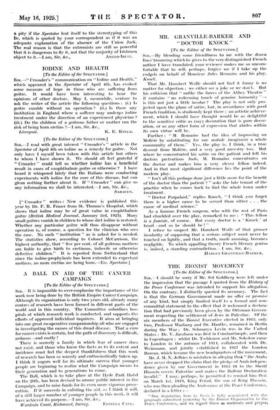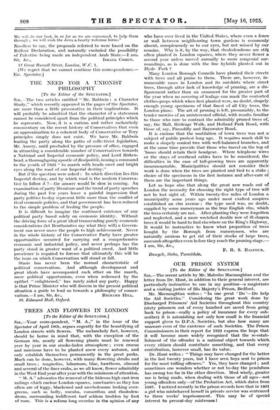THE ZIONIST MOVEMENT
[To the Editor of the SPECTATOR.] SIR, I should be sorry if Mr. Sol Goldberg were left under the impression that the passage I quoted from the History of the Peace Conference was intended to support his allegation. On the contrary, I distinctly queried its accuracy. The fact is that the German Government made no offer or promise of any kind, but simply limited itself to a formal and non- committal statement to the effect that it welcomed a declara- tion that had previously been given by the Ottoman Govern- ment respecting the settlement of Jews in Palestine. Of the six members of the Zionist Executive elected in 1913, only two, Professor Warburg and Dr. Hantke, remained in Berlin during the War ; Dr. Schmarya Levin was in the United States ; Dr. V. Jacobson was first in Constantinople, and then in Copenhagen ; whilst Dr. Tschlenow and Mr. Sokolow came to London in the autumn of 1914, collaborated with Dr. Weizmann, and jointly established in 1917 the London Bureau, which became the new headquarters of the movement.
Mr. J. M. N. Jeffries is mistaken in alleging that " the Arabs. have never dropped the claim that the pledge of Arab indepen- dence given by our Government in 1915.-16 to the Sherif. Hussein covers Palestine and makes the Balfour Declaration. invalid." I may, perhaps, be permitted to remind him that on March 1st, 1910, King Feisul, the son of King Hussein, who was then pleadingthe Arab cause at the Peace Conference, declared in a letter :— " Our deputation here in Paris is fully acquainted with the proposals submitted yesterday by the Zionist Organization to the. Peace Conference, and we regard -them as moderate and proper, We will do our best, in so far as we are concerned, to help them through ; we will wish the Jews a hearty welcome home."
Needless to say, the proposals referred to were based on the Balfour Declaration, and naturally excluded the possibility of Palestine being made an independent Arab State.—I am,
17 Great Russell Street, London, W.C. 1.
[We regret that we cannot continue this correspondence.— En. Spectator.]











































 Previous page
Previous page